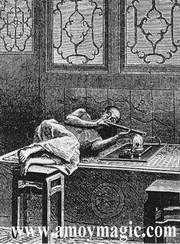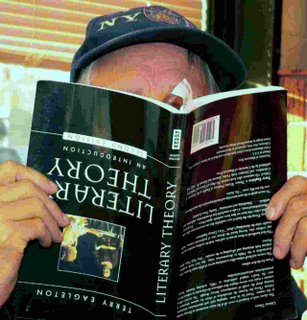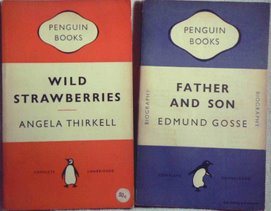The Last Opium Den: Grit-Lit Criticism
Nick Tosches (author of The Opium Den)
© Anthony Voisin
This short book (a hand-sized hardback with luxury dust jacket) features a writer-as-cynic looking for something long-lost in a macho world. Yet all of us know that some of the best travel essays have been written by men who were androgynous to the point that they eventually underwent a sex-change operation to prove the point. My exception that proves our rule is James Morris who wrote a fine book on Trieste (I won't mention his name again, however, in this post).
I'm setting the scene to run the blurbs for two books on opium smoking. Nick Tosches, six years ago, authored "The Last Opium Den". I just read the book, which is now wider nor taller than my hand. All 74 pages were enjoyable in the same way many articles in the New Yorker, Vanity Fair or Gentleman's Quarterly are diverting and factual. Tosches highly praised the second book whose blub you'll see shortly, Opium Culture by Peter Lee, which I've never looked at.
One thing missing, a sort of contradiction in what I read between the lines and the spin of the Nick Tosche persona : opium is not a woman's sport. Opium is entirely a male thing or it is totally sex-less and a-hedonic. Only the pursuit of the drug, the chase, has testosterone running through it.
An opium den (which is the rarest thing on earth today according to the book) is and always was a filthy hovel where men lie down on little mats cheek by jowel and get dreamy and high on the drug. Yet the author never makes us aware of the male bond, the male environment, nor the subjugation of the women on the periphery of the opium culture. Smoking opium it seems, however, is entirely an escape from women the same way the bar room 'tavern culture' has historically been nearly everywhere in the West.
Tosches does, however, suggest that the term 'hip' may trace its roots to the opium den. I do not think he is stretching the point. Imagine the scene of views scores of spaced out smokers all lying down on their sides on the floor. Rising above this sea of a poorly lit bodies, all that sticks above the maze of mats and bodies are their hips. (Sorry this is the only image moment -- send me a link to one if you know of one.)
I think what Tosches leaves unmentioned is interesting because the macho spin of his book blurb suggests to me one of two routes: he is going on a quest -- with or without a core of self discovery. In fact I'm wrong, he may be out for conquest of others, but this seems far from the genre this books is slotted into. On still one more level I guessed wrong again: self identity in the grit-lit genre, as in "The Last Opium Den" is no more, sometimes less, than the persona set up exactly like the blurbs for the author. It is a more literate Marlboro Man. A Jack London or Hemmingway.
The apriori here is 'I'm not a prissy man. Now I'm going on a quest to discover the world. But I won't get all gushy and sentimental about it. I can take my knocks, just as long as I reach MY goal: To Find the Last Opium Den."
At least in a Brechtian lyric I seem to remember, Brecht (maybe it was Kurt Weil) added "Oh, don't ask why (bis) I tell you, I tell you, I tell you we must die." The reason this is pertinent is that in his quest for this opium experience, the author goes to all (all the principal southern) hotspots of both the Kmer Rouge and the Mekong battle zones of 1954 to 1974 and not once does he utter a single phrase about the Vietnam war nor the Pol Pot dictatorship. He hardly mentions civil war in Thailand going on today though he gets shot at when the driver of a motorcycle carrying him decides to run a military roadblock!
Enough said. Don't fret about the plot. The following blurb will give it all away. And I still want to find and read Peter Lee's book despite all these reservations.
Since this is a 'rip' from the publisher, I run the entire press release below about Nick Tosches and The Last Opium Den, complete with the header they provided:
Contact: Yelena Gitlin
Senior Publicist
Bloomsbury
212-674-5151 ext. 617
yelena.gitlin@bloomsburyusa.com
Everyone warns him that opium dens had gone the way of Model Ts and silent movies—relics of a bygone day. That opium, in its pure form, known as chandoo, was a dead drug. Undaunted, and driven by romantic visions of dark brocade curtains, velvet cushions of luxurious decadence, and hushed conversations with exotic concubines mingling with a pungent smoke, Nick Tosches goes in search of the elusive opium den. Traveling from Europe to Hong Kong to Cambodia, Tosches chronicles his quest in THE LAST OPIUM DEN (Bloomsbury, January 8, 2002, $12.95, cloth).
Tosches, a New Yorker, is not concerned by the fact that the last known opium den in Manhattan was raided and shut down in 1957. It was a second-floor tenement on Broome Street, at the northeastern edge of Chinatown, run by the tenant, a Chinese immigrant named Lau. Lau was 57 years old when the joint was raided and was hauled away along with a few old pipes and various paraphernalia, and about 10 ounces of opium. Assured by his sources that even in Asia, the opium dens had all vanished in the last two decades, Tosches still could not, or would not believe it, and left New York in search of the Big Smoke.
Picking his way through alleys where sex, murder, gold, guns or dope can be had for any price, Tosches is unable to find an opium den in Hong Kong. Why? Because there is no such thing. On to Bangkok, where teenage girls can be bought for a night for about four dollars, but still, no smoke. Bangkok, with its vast Chinatown, is said to have boasted the biggest opium den in the world, though not even a trace of the drug remains. In Cambodia, however, Tosches finds enlightenment in a palm frond hut on stilts, in the middle of a swamp, a place that can only be reached via moto. There, he is introduced to the pleasures of the ‘celestial drug.’ Of the experience, Tosches says ‘I am not going to rhapsodize here about opium. But I will say this: it is the perfect drug. There is nothing else like it.’
The smoking of opium, Tosches tells us, dates back to the Bronze Age. Recent archaeological discoveries in Cyprus have brought to light what very well may be opium pipes. Opium smoking was practiced in China in 1500, before that, it was ingested or taken as laudanum; the stuff was introduced to the Chinese by Arab traders in the year 400. The mixture of opium and wine is alluded to in Homer’s Odyssey, and the Greeks not only gave the poppy sap it’s name, but named a city after it (the Doric word for the opium poppy became mekon to the classical Greeks, who gave the town of Kyllene it’s olden name of Mekone. There, in a sanctuary of Aphrodite, an image of the goddess once stood with an apple in one hand, a poppy in the other).
Part travelogue, part history lesson, and part cultural meditation, THE LAST OPIUM DEN is as much an account of spiritual longing and lust of a time past as a quest for a lost drug. Tosches, hailed by the Boston Globe as ‘the grandmaster of grit lit,’ can write about the seedy drug underworld like no one else can, and spins out gorgeous and lucid prose, along with a completely original and unpredictable story.
ABOUT THE AUTHOR:
Born in Newark and schooled in his father’s bar, Nick Tosches is the author of the acclaimed biographies of Dean Martin (Dino), Mafia financier Michele Sindona (Power on Earth), Sonny Liston (The Devil and Sonny Liston), and Jerry Lee Lewis (Hellfire); and of the novels Trinities and Cut Numbers. He is a contributing editor at Vanity Fair.
----------------------------
---------------------- OPIUM CULTURE
Now the other Opium book, the one highly touted by Tosches
BLURB -
In Opium Culture, Peter Lee fills this information gap with a fascinating narrative that covers every aspect in the art and craft of smoking opium. Beginning with a concise and colorful account of opium's history and how it came to be smoked for pleasure in China, Lee then delves into a detailed description of how the poppy is grown and harvested, how the raw sap is refined for smoking, how the exotic inventory of tools and paraphernalia are used to smoke opium the Chinese way, as well as the art and etiquette, the pharmacology and philosophy, and other essential aspects of this traditional Chinese custom. The text is highlighted throughout with interesting quotes by literary luminaries who smoked opium and studded with gems of long forgotten opium arcana.
--- A final remark: neither author connects the dots between the occupation of Afghanistan today and the continuing cultivattion of the poppy. (One caveat being that Lee may have somewhere without the reviewers mentioning the fact).
We can surmise that the opium from Afghanistan is refined not into the opium smoked by Tosches' contacts but goes to make morphine and heroin for the world market. Tosches, to his credit, mentions the Opium Wars waged by Britain against India in the 19th century in their imperialist scramble to monopolize and expand the trade for the greater profit of Great Britain.



No comments:
Post a Comment